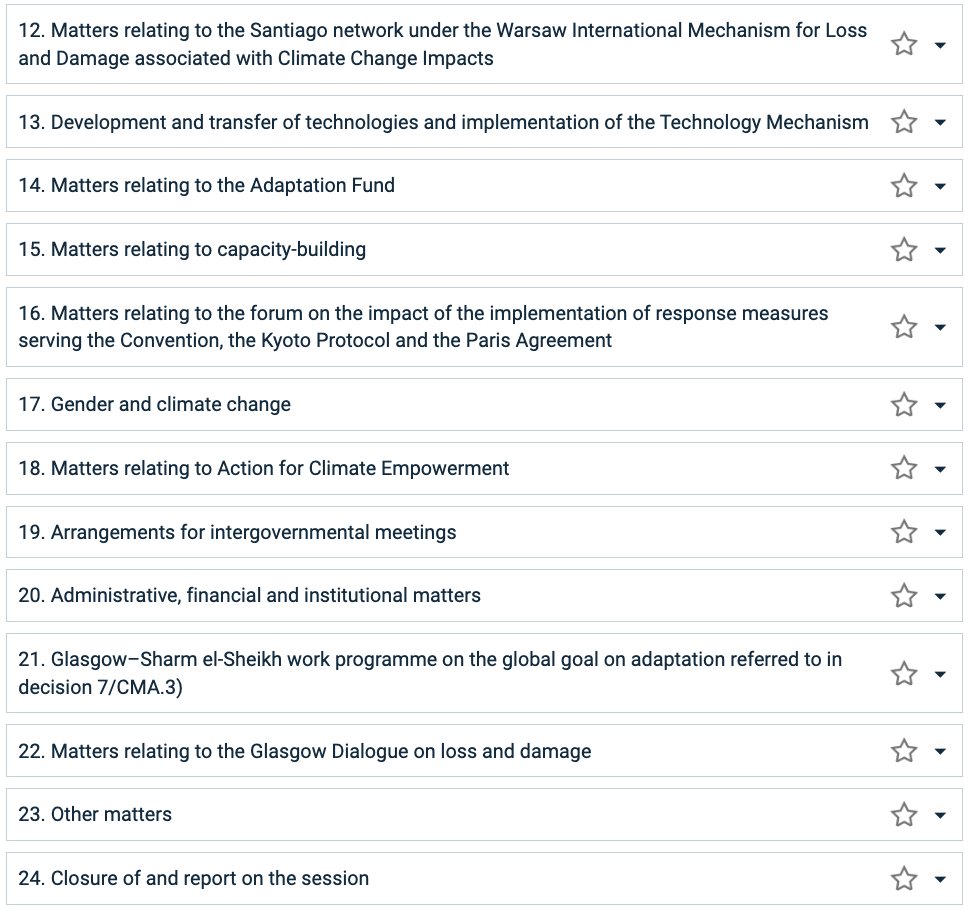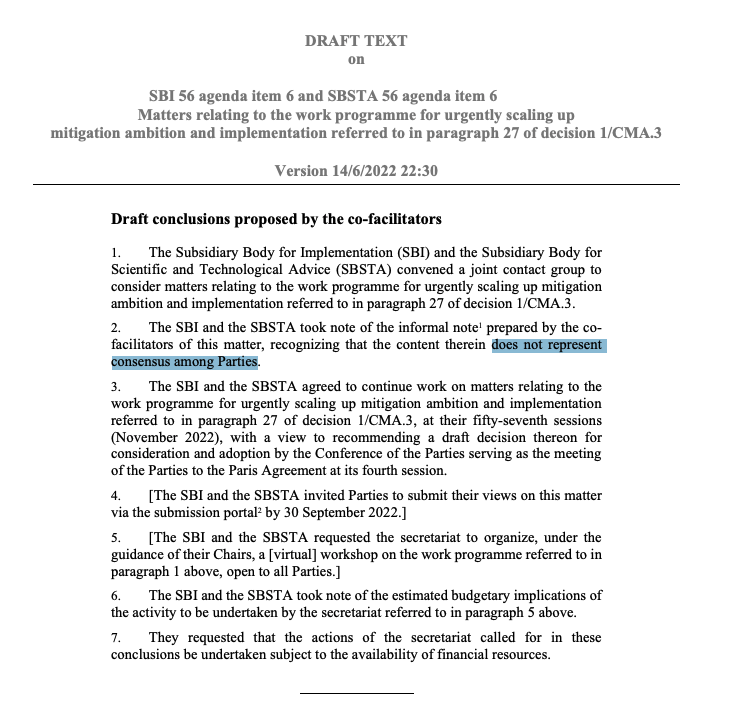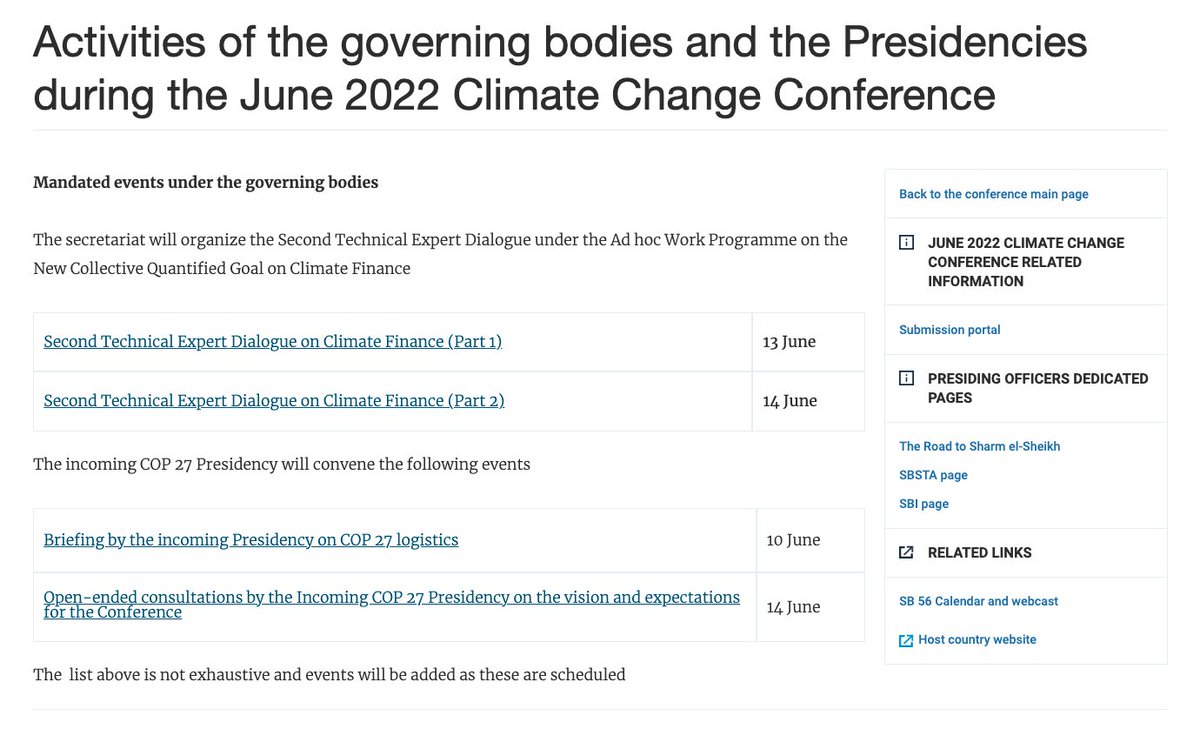
THREAD
This week & last, climate negotiators from around the world have been meeting in Bonn #SB56 ahead of the next UN climate talks COP27 in Egypt
We'll be publishing a full @CarbonBrief summary
But meanwhile, what have they been talking about?
1/n
unfccc.int/SB56
This week & last, climate negotiators from around the world have been meeting in Bonn #SB56 ahead of the next UN climate talks COP27 in Egypt
We'll be publishing a full @CarbonBrief summary
But meanwhile, what have they been talking about?
1/n
unfccc.int/SB56

COP26 last year finalised the Paris Agreement, but it also gave climate diplomats a lengthy to-do list
✅A "dialogue" on loss & damage finance
✅A "work programme" on adaptation targets
✅A "work programme" on faster emissions cuts
✅…and much more!
2/
carbonbrief.org/cop26-key-outc…
✅A "dialogue" on loss & damage finance
✅A "work programme" on adaptation targets
✅A "work programme" on faster emissions cuts
✅…and much more!
2/
carbonbrief.org/cop26-key-outc…
If you're brave, you can see these to-do list items reflected in the *provisional* agendas of the meetings (yes, meetings plural) in Bonn…
SBSTA, the UNFCCC technical body
unfccc.int/event/sbsta-56
SBI, its implementation arm
unfccc.int/event/sbi-56
3/



SBSTA, the UNFCCC technical body
unfccc.int/event/sbsta-56
SBI, its implementation arm
unfccc.int/event/sbi-56
3/




In fact, the "Glasgow Dialogue" on loss and damage finance did not make the cut and so has not been formally part of the SBI agenda, as @ChloeFarand reported here:
4/
climatechangenews.com/2022/06/10/fru…
4/
climatechangenews.com/2022/06/10/fru…

…but the dialogue itself did start to take place in Bonn. You can even watch the sessions on demand.
Confused? Me too!
In short:
Dialogue = talking
On the agenda = decisions can be made
You'd need a decision to set up a new finance facility…
5/
unfccc.int/event/glasgow-…
Confused? Me too!
In short:
Dialogue = talking
On the agenda = decisions can be made
You'd need a decision to set up a new finance facility…
5/
unfccc.int/event/glasgow-…

The "work programme" towards a global goal on adaptation (GGA, as if there weren't enough acronyms already) did make the cut to be on the formal agenda in Bonn; some groups formally submitted their views and we even got a draft (decision) text
6/
unfccc.int/event/sbi-56#e…
6/
unfccc.int/event/sbi-56#e…

The LMDC group of big developing countries, including China & India, submitted a paper calling for, amongst other things, extra finance for adaptation
7/
unfccc.int/sites/default/…
7/
unfccc.int/sites/default/…

The draft GGA decision text draws on a paper from the African Group, but is heavily bracketed (22) & filled with options (37), meaning it's far from being agreed
At this stage, they're haggling over what to discuss in a series of workshops (!)
8/
unfccc.int/sites/default/…



At this stage, they're haggling over what to discuss in a series of workshops (!)
8/
unfccc.int/sites/default/…




For the "work programme" on "urgently" scaling up emissions cuts, discussions look to be a long way from consensus, which is v reassuring 🤡
It was on the agenda, they talked about it, but couldn't agree even on basics like how long it should last
9/
unfccc.int/event/sbi-56#e…
It was on the agenda, they talked about it, but couldn't agree even on basics like how long it should last
9/
unfccc.int/event/sbi-56#e…

You can see the draft conclusions here
To paraphrase "we couldn't agree, ppl suggested some ideas, pls send more ideas before October"
…even the invitation to submit more ideas is, in itself, not agreed (see the [square brackets] around item 4)
10/
unfccc.int/sites/default/…
To paraphrase "we couldn't agree, ppl suggested some ideas, pls send more ideas before October"
…even the invitation to submit more ideas is, in itself, not agreed (see the [square brackets] around item 4)
10/
unfccc.int/sites/default/…

You can see the grab-bag of ideas being discussed in this "informal note", which is a collection of everything suggested, without any judgement on what should ultimately be included
11/
unfccc.int/sites/default/…
11/
unfccc.int/sites/default/…

As reported by @ClimateHome latest newsletter and shown by the "informal note", countries can't even agree on how long the "urgent" dialogue on raising ambition should last – whether one year only or all the way out to 2030 – or who should be focus
12/
unfccc.int/sites/default/…

12/
unfccc.int/sites/default/…


Elsewhere, the Bonn talks also included "technical expert dialogue" on climate finance, looking ahead to the new target that will replace the existing (not yet met) goal of $100bn by 2020
This new target will be a big feature at COP27…
13/
unfccc.int/process-and-me…
This new target will be a big feature at COP27…
13/
unfccc.int/process-and-me…

If you thought "Article 6" on intl carbon markets was agreed at COP26, you're right, but there's still a whole bunch of new processes to put in place before any of it can start to operate… (6.4, L)
…and guidance needed for bilateral deals (6.2, R)
14/
unfccc.int/event/sbsta-56…

…and guidance needed for bilateral deals (6.2, R)
14/
unfccc.int/event/sbsta-56…


Beyond those items, a whole load of other stuff was being discussed in Bonn, from the Global Stocktake that will show (again) how far off track we are, to the Koronivia joint work on agriculture, the WIM on loss and damage, or the forum on response measures
15/ends
15/ends
• • •
Missing some Tweet in this thread? You can try to
force a refresh













